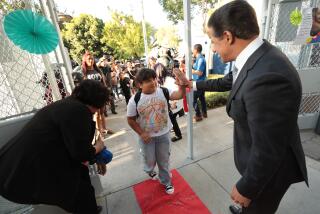Despite Official Return to Phonics, Many Endorse ‘Whole Language’
A year ago, the California Legislature declared a return of phonics to classrooms. Sixty percent of the state’s fourth-graders could barely read and, after a decade of experimenting with “whole language,” politicians and parents had lost their patience.
The state offered school districts $40 million for teacher training and $150 million for new reading books--as long as the training stressed letters and their sounds and the books gave students phonics practice.
Even so, the New Zealand methods maintain a strong hold on California schools and teachers.
“I’ve not been fazed by the back to basics, phonics emphasis . . . la da da da da,” said Leanna Traill, a former principal from Auckland who works as a $3,000-a-day consultant for, among others, the Los Angeles and Glendale school districts. “Nothing that’s happening is going to take us back to what we used to do.”
Yes, she says, phonics are important. But overdoing it can be dangerous. Children taught to decode too well can skate through texts without understanding them.
Good readers, she says, do not read every word. They “scan” texts, predicting what the next word will be.
Her message is one many U.S. reading experts reject. Good readers do read every word, they say, and rely foremost on letters and their sounds. The State Board of Education is preparing to warn school districts that they may have to return money spent on such seminars if the content conflicts with what is specified in state law.
But American educators are drawn to heralded success stories like New Zealand’s in reading--especially when their own classrooms are beset by declining test scores and discipline.
More to Read
Sign up for Essential California
The most important California stories and recommendations in your inbox every morning.
You may occasionally receive promotional content from the Los Angeles Times.










